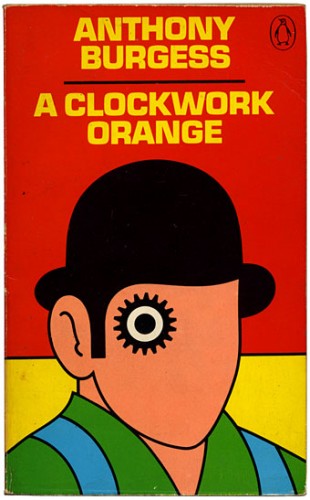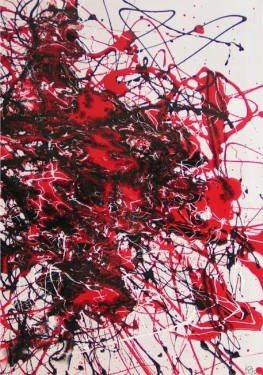65. A Clockwork Orange
Droog! This Book is the Cal
Modern Library # 65
1962, Anthony Burgess
 I know. You’ve “seen the movie.” Without scanning over the list of 100, I’m going to say with no proof or even the most minimal of research that this book and Deliverance are probably the top two for “I’ve seen the movie.” (Okay, maybe Sophie’s Choice and From Here to Eternity too, but the former is too depressing and the latter is too old for me to consider.)
I know. You’ve “seen the movie.” Without scanning over the list of 100, I’m going to say with no proof or even the most minimal of research that this book and Deliverance are probably the top two for “I’ve seen the movie.” (Okay, maybe Sophie’s Choice and From Here to Eternity too, but the former is too depressing and the latter is too old for me to consider.)
And don’t get me wrong – both are great movies. Now that I think about it, both leave the viewer with a very similar squeazy feeling too. I’ve not yet read Deliverance but I have now read Clockwork which is why I’m writing this page. Duh.
Two things before I get going… One, my wife loved this book. And she’s never seen the movie, so it will be interesting when we sit down some day to watch it. (I have the whole Stanley Kubrick collection on DVD somewhere.) And two, the edition I read contained 21 chapters and not the 20 which was all that was available in the US from original publication in 1962 all the way until 1986. The movie, by the way, is also based on the 20 chapter version.
Of course, this whole missing chapter thing really upset the author, Anthony Burgess. In the edition I read, Burgess had the pleasure of writing an introduction which was a several page screed against the US publishers, Kubrick and the poor, disillusioned masses who were simply never made aware of the missing 21st chapter.
For his part, Kubrick claimed to have been completely unaware of the 21st chapter until he was done his screenplay. He also called it an “extra” chapter that was inconsistent with the previous 20. This was quite the affront to Burgess who purposely made the book 21 chapters long (21 representing the true age of maturity in his mind) and who felt (obviously, as he wrote the damn thing) the true ending of the story was rather important.
So why start with the end of the book rather than the beginning? Because I figure that the large majority of people who have read down this far know the story already. Or rather, they think they know the whole story already, ending with young Alex impishly smiling at the camera, “I was cured alright,” leaving the viewing thinking he probably wasn’t. Especially since he was in a full body cast and had been brainwashed.
So what happens in the end of the full book? Alex IS cured alright! For real… But I’ll back up.
If you read the book and have trouble with the made up Nasdat slang that Burgess created from Russian, you should probably skip the book and skip any book beyond the pre-teen set. Yes, there are a lot of made up words but really people, they are all in context and are quite easy to figure out. Many even make sense if you think about them and after maybe 40 pages, you read them as they are printed and think of the corresponding english word with no hesitation.
 Clockwork is a rather disturbing tale of some teenage friends in England (though really, it might as well be Anytown, USA in 2012) who have fun by committing ultra-violent acts upon innocent people. They commit murder. They rape a random housewife and then retire calmly to the bar. Alex, the main character, rapes a couple pre-teens and thinks nothing of it. (Yeah, the movie changed that bit up too.) The boys revel in the horror and even Burgess once said he felt sick writing from their point of view.
Clockwork is a rather disturbing tale of some teenage friends in England (though really, it might as well be Anytown, USA in 2012) who have fun by committing ultra-violent acts upon innocent people. They commit murder. They rape a random housewife and then retire calmly to the bar. Alex, the main character, rapes a couple pre-teens and thinks nothing of it. (Yeah, the movie changed that bit up too.) The boys revel in the horror and even Burgess once said he felt sick writing from their point of view.
The quirky slang and the boys’ ambivalence towards their acts almost lulls the reader into their world – which, like our world, is such now that something awful has to almost personally affect us to get a rise anymore. A heinous murder in another city? Eh, what’s the weather tomorrow?
At some point, Alex’s carousing has to catch up to him and it does. He’s sent off and “reprogrammed” by the government to hate violence. Everyone is familiar with the scene in the movie where Alex’s eyes are forced open, right? Yell, well, the reconditioning is a bit more involved than that and he emerges from his hyper-intense brainwashing a new boy. He is literally incapable of committing violence or even saying mean things – or he feels so physically ill that it’s unbearable. He can no longer enjoy his beloved Beethoven either. So sad.
I think some programs to stop smoking work like this too.
So Alex reaches the point where his physical reaction to violence competes with his lifelong lifestyle and, well, he tries to kill himself. His becomes a cause-celebre against such government meddling and the program is deemed a failure of sorts (even though it worked) because it tried to overcome “nature” and screwed up a human.
Which leaves us at the end of chapter 20. Burgess wrote (and Kubrick directed) Alex to, in a very troubling and weird way, be a sort of anti-hero that evokes sympathy from us. He’s an awful, horrible, evil human being and yet, he’s charming and somewhat convincing. When he is reprogrammed, we the readers actually begin to care that this unrepentant jackoff has been harmed by the state.
And his suicide attempt and smarmy “I was cured alright” was meant to convey that he was “cured” by his near-death and he’d be back out raping and pillaging ASAP. Get it? Well, don’t, because as I said, the real story continues…
Which brings me to the title. A “clockwork” is a perfectly engineered mechanical thing and an orange is a wonderful “creation” of nature. The two make no sense together – sort of like trying to reprogram a “naturally” flawed brain. It just doesn’t work, you see, and results in an (arguably) worse mess than which you began. Is Monsanto listening?
In the last chapter, Alex runs into his old mates who are living perfectly normal lives: married with kids and heck, one’s a policeman! Alex falls in with a new younger crew still up to no good when he sort of has an epiphany and realizes on his own that perhaps being a completely evil person isn’t such a good career path.
And he redeems himself.
Now if only I could redeem Roger Ebert who wrote a rather embarrassing critique of the film version, blaming Kubrick for a LOT of stuff Burgess wrote.
Hoang Completed: 2003, Rating: 10
Steve Completed: 2011, Rating: 8
Back to Top 100 Modern Library books
Artwork: Chrystel Mialet, Violence






Burgess was inspired to write the book after four men (American soldiers IINM) raped his wife.
Comment #1 on 02.23.12 at 1:48 am